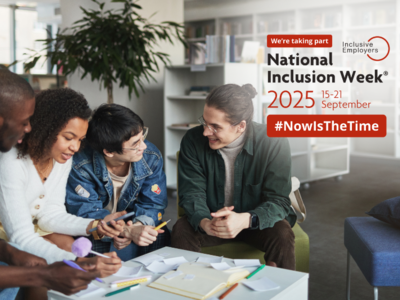✨ Today is Autism Acceptance Day which also kicks off Autism Acceptance Week and Month! In a world that thrives on diversity and inclusion, employers need to create an environment that not only understands but also celebrates neurodiversity.
But what practical steps can be taken to support our teams better? How can we ensure that our workplace is not just accommodating but truly accessible for autistic individuals?
In this blog, we've put together our top tips for building a workplace where everyone, irrespective of their neurodiversity, feels valued, understood and supported.
How can we create a more accessible environment for Autistic people in the workplace?
📚 Educate yourself: Understanding autism, neurodiversity and different abilities is crucial for effective support in the workplace. Take some time to learn about these topics; it makes all the difference in how you offer support.
🔑 Clarity is key: Make sure information is straightforward and easy to grasp. That means no surprise meetings without a heads-up, setting clear expectations right from the start, and explaining any jargon or abbreviations. Don't assume everyone's on the same wavelength.
🙋♂️ Questions welcome: In some workplaces, asking questions might be seen as challenging or showing ignorance. It's vital to create an environment where everyone feels comfortable seeking clarification. This way, everyone can perform at their best.
🌟 Support, not special treatment: Requests for accommodations are sometimes misunderstood as asking for perks or an easier route. It's essential to recognise that making adjustments for disabled employees isn't about preferential treatment; it's about ensuring everyone has the same opportunities to succeed.
🤔 Think before you speak: Before pointing out something about someone, consider if it's really necessary or something beyond their control. Remarks like "you're too literal" or "why so many questions?" often highlight traits that a person, especially someone who's autistic, can't change. It's not helpful, just uncomfortable.
Here are our top five tips to consider before booking a meeting!
📧 Reconsider the need: Start by asking, "Is a meeting essential, or could an email suffice?" It’s a small shift that respects everyone’s time and comfort.
📰 Share the plan: Ensure everyone gets a complete agenda ahead of time, so they know exactly what to expect. This step can ease anxiety and help attendees prepare.
🖥 Camera choices: Make it clear that turning off the camera is completely fine. This flexibility can significantly increase comfort for those who might feel camera-shy or overwhelmed.
💬 Flexible communication: Encourage attendees to use the chat for real-time input or to follow up with an email if they’re more comfortable expressing themselves in writing. It’s all about providing options.
🙌 Focus on being present: Let everyone know you’ll record the meeting and share a summary of action items afterward. This approach allows attendees to fully engage without worrying about note-taking.


